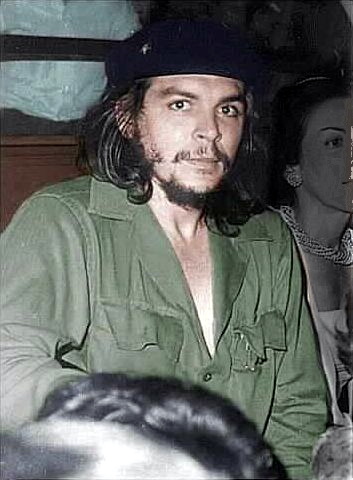Carlos Tablada's book "Che Guevara: The economics
and politics in the transition to socialism" is a Cuban book originally
published in 1987. The English translation was issued in 1989 by Pathfinder
Press, the publishing arm of the U.S. Socialist Workers Party, an ex-Trotskyist
group which supports the Cuban regime. The book was published during a period
in Cuban history known as "the rectification", a kind of
anti-perestroika during which the Cuban Communist Party attempted a return to
the earlier and more "heroic" phase of the revolution. Part of this
meant unearthing the political and economic ideas of Ernesto Che Guevara, who
had been largely scrapped during the 1970's.
Tablada's book is written in a style both rhetorical and dense, with a lot of quotations from Marx and Lenin. It sometimes deals with issues that are probably near-esoteric to everyone but scholars of Cuba and perhaps elderly Cubans. For this reason, "Che Guevara" could be a heavy read. Still, I admit that the book is less loaded with rhetoric than works published in the Soviet bloc sensu stricto. Due to its "in-house" character, Tablada's exposition of Guevara's economic thought will probably mostly interest advanced students of recent Cuban history, or perhaps very intellectual Marxists.
Che Guevara criticized what he called "the economic accounting system", in fact the planned economy in the Soviet Union, which the Cuban revolutionary found too moderate. He was even more sharply critical of Tito's self-management after a visit to Yugoslavia. Guevara's alternative was "the budgetary finance system", a super-centralized planned economy, under which the entire economy of Cuba was treated as a single company. Prices were to be set based on political priorities, not economic efficiency. Thus, prices on basic foodstuffs, for instance, could be lowered below their "real" price, while luxury items could be priced far above their market price. The profits of each individual company would go directly to the national budget. In this way, unprofitable businesses would be quickly subsidized with profits from profitable businesses. The entire system would be supervised from a tightly-knit centre, and subjected to rigorous and efficient controls.
There was a small problem, however. How can the state know which enterprises are efficient and profitable, if the market prices (the real prices) are completely suppressed? How can "prices", "profits" or "wages" even *exist* in a system where the pricing mechanism has been dispensed with? In practice, Guevara's system would entail super-detailed planning in physical units, payment in kind, and rationing. Indeed, Cuba did have rationing the first years after the revolution, and Tablada candidly admits that the budgetary finance system would have entailed a strict planning and control of the population's consumption patterns. Another hallmark of the system was reliance on voluntary labour (the book features several photos of Che himself carrying out such). Curiously, the Cuban regime also instituted the typically Soviet system of bonuses for overfulfilment of the production quotas.
Guevara's ideas would make "Austrian" economists weep, and even I find them somewhat unrealistic, and at times frankly incomprehensible. Interestingly, Guevara himself seems to have understood that no reliable economic indicator of efficiency could exist in his radically socialist system. To solve the problem, he proposed to use the world market prices as a measuring stick for the Cuban economy. In other words, he was cheating! After attacking the Soviet system for its backhanded reliance on the "law of value", Guevara was forced to rely on it himself, by treating Cuba as a single company operating on the world market. The world market would tell the planners the real prices of various products, who could then be priced higher or lower than their actual value before reaching the consumers - in effect, a more centralized version of what many governments around the world are doing already through subsidies or sales taxes.
As already mentioned, in the absence of world market prices, Guevara's system would become a form of War Communism based on planning in physical units, payment in kind, and strict rationing. Marx and Engels attacked similar proposals as "barrack socialism". In North Korea, an artificial program of this type has led to a bizarre form of neo-feudalism, rather than the egalitarian levelling presumably favoured by Guevara.
Today, "Che Guevara: Economics and politics in the transition to socialism" feels very dated. In fact, Castro had to reverse his politics shortly after its publication, due to the collapse of the Soviet bloc. But that's another story.

No comments:
Post a Comment